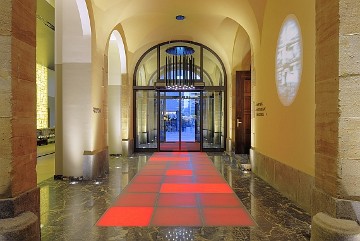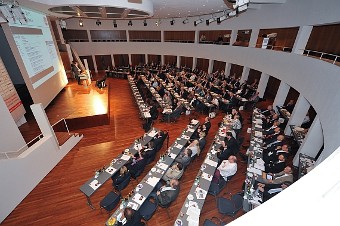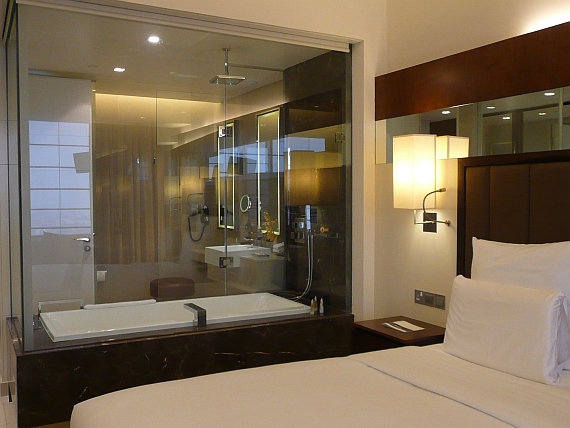
News & Stories
Dubai. Rumours, which hospitalityInside.com already got wind of at IHIF in Berlin in March, were refuelled by an interview: Kingdom Hotel Investments is examining its 33.3 percent stake in Moevenpick Hotels & Resorts.
Hong Kong. Dallas-based hotel group Rosewood Hotels & Resorts will be acquired by a Chinese company also operating German-based pentahotels.
Leipzig. The old is part of the luxurious today: The owners, architects and artists have lovingly maintained the historical character of Leipzig's Handelshof; have included Goethe's poetry and current design and so created the Steigenberger Grand Hotel Leipzig. The result is an unusually varied and lively luxury hotel in one of the most important historical buildings of the city. "Young" Grand Hotels such as this are to carry Steigenberger's image abroad; CEO Arco Buijs intends to earn money with the group's 3 and 4-star hotels. The official hotel opening was on Tuesday of this week. A hotel visit and a conversation with Arco Buijs.
Freiburg. The currently burning subjects of the "lost" price control and sustainability were in focus at the German Hotel Association/IHA Hotel Convention 2011 in Freiburg with more than 200 participants. The speakers called to the hoteliers to further advance their websites and their price control because the next generation as well as "emerging markets" will only search and book through mobile devices in the future. Hoteliers can still utilise the internet for many other purposes, e.g., with job placement. In addition to the online distribution and the web, the hoteliers debated over the flood of sustainability labels. The figures of the more successful "green" hotels were opposed with scepticism.
Munich. Salzburg, Munich, Berlin, Munich... In recent times, Motel One Hotels have opened in an almost weekly rhythm. The rhythm will not be maintained in this number of cycles, but Co-CEO Philip Westermann still sees plenty of room for Motel One. The international expansion is incumbent upon the former investment manager with Morgan Stanley. Now, the first projects beyond the German-speaking realm are definite: In Great Britain, Belgium and Poland. Meanwhile, in the home market of Germany - for which the group still grants "first priority" - Motel One, points out what small changes can be made to increase the value of the 2-Star products. This is of particular benefit to the larger properties. Two days ago, the group opened their largest hotel up to now: The Motel One Berlin Central Station counting 505 rooms. Observations and a conversation with Philipp Westermann.
Munich. Hyatt Hotels & Resorts is launching an extraordinary offer for female hotel guests called “Hyatt for Her” in its hotels in Berlin, Duesseldorf, Hamburg, Cologne, Mainz and Zurich.
Gothenburg. For any hotelier strategic decision making is a complex task. The debated question of affiliating or staying independent is always valid and at the same time daunting. Should I give up my freedom and independence to get the benefit of a brand name and at the same time being controlled by a large organisation? The old proverb "location, location, location” could to a certain extent be replaced by "flag, flag, flag”, as to what, if any, brand one should affiliate with. A guest article by Mats Carlbaeck, researcher at Gothenburg University.
Dubai. Accor, Europe’s largest hotel operator, plans to add 44 new hotels in the Middle East and North Africa by 2014, with a focus on the United Arab Emirates and Saudi Arabia, banking that their oil wealth, robust economic growth and vast infrastructure projects will spur demand for rooms, the firm’s Chief Development Officer Christian Karaoglanian said. Novotel is one of the most popular brands in the region. The Pullman Dubai is a real flagship and the initial difficulties with the economy brands have become a thing of the past, adds Charlie Langlais, Chief Operating Officer for the Middle East, Africa, Indian Ocean and the Caribbean. hospitalityInside.com met both managers in Dubai two weeks ago.
Prague. Mamaison Hotels & Residences describes itself as a leading provider of personalised hotel experiences in Central and Eastern Europe. Founded in 1999 with its base in Prague, today the group operates ten individual hotels with approximately 650 rooms in Moscow, Warsaw, Prague, Ostrava, Bratislava and Budapest. Christian Kettlitz has been determining the fate of the boutique brand as the CEO since January, 2011. In a conversation with Franco Peruza, he seems convinced of the positive future for the CEE markets and of the strength of personally managed hotels.
Madrid. Chinese hotel chain HNA wants to become shareholder of Spanish NH Hoteles. Together the two companies plan a joint venture for the management of hotels in China under the brand name NH.






